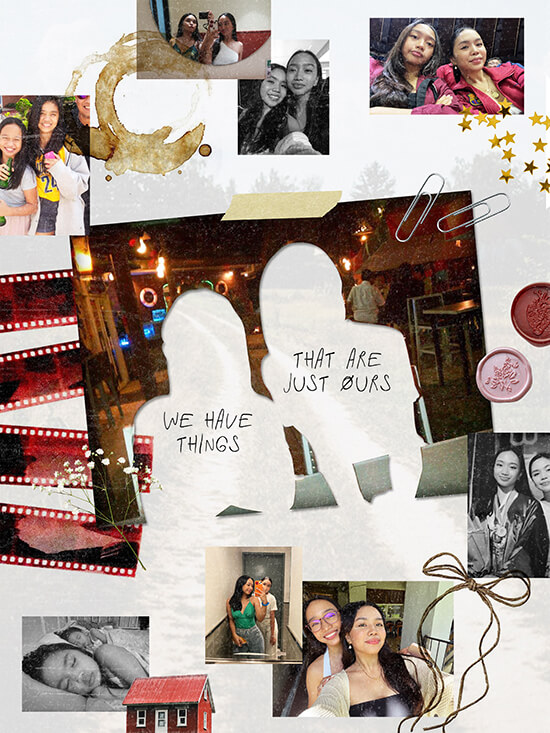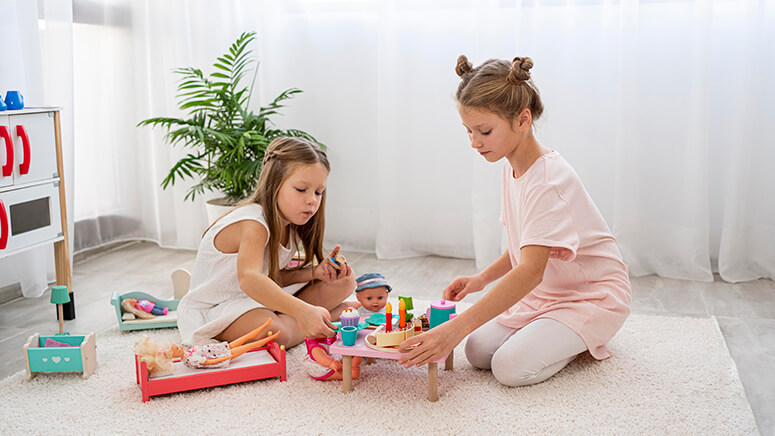No me without you
Our siblings are the longest relationships of our lives.
Elder looking after the younger with begrudged lethargy, younger snitching on the elder with skittish excitement. The anxious texts born from sneaking out under parents’ noses. The loud fights, the nonverbal apologies that followed. The first impressions of friends and boyfriends. The backseat laughs, hushed first then louder, over a joke or film reference no one else would’ve understood.
Onlookers of a sibling relationship, especially those who have none, will simply grapple their whole lives over trying to figure out what’s so funny. Siblinghood is perhaps one of the only relationships that last so long in our lives—nearly forever—yet born entirely out of obligation.

I don’t speak for all siblings when I chronicle these few universal experiences that come with the confusion of having one. But the beauty and confusion lie precisely in the fact that it’s different for many. In my 18 years of having a sister four years my senior, I’ve experienced what feels like enough sibling clichés for a lifetime. (Two items remain on the elusive, imaginary Sibling Bucket List: fight over land and betray her in said land scheme. Problem: no land to fight and/or betray over. Items to be revisited.)
Everything else, though, we completed. We played house, princess, doctor; I was always the pet, the old king, the sick patient. She always had to go first, and whatever she didn’t want went to me. We each claimed a member of One Direction as a husband and I learned the hard way that Niall was off-limits. She raised the middle finger, I tattled to our parents, we fought and she yelled she could never trust me.
I suppose the fact that it’s difficult to love siblings is what makes the love weather wars of expletives and hair pulls, over a stolen tee or eye roll.
We spent the summer of my ninth year begging our parents for McDonald’s money, watching movies that only a 13-year-old like her would’ve found funny. Every comedic scene would end with my laughs echoing hers, a few seconds too late for a joke I didn’t understand yet.
My sister was my idol and I was her mirror. Somewhere between her graduating elementary and eighth grade, playing house lost its color for her. The jokes we exchanged bombed around her friends—moments when I was just a kid, not her sister. It was no longer cool for me to mimic her outfit, and an hour of effort (eyeing her shirt, digging through my closet to find one remotely similar) went to waste while our mom found me a completely different one. But whatever my sister was, I longed to be. I looked up to her, jealous of her expertise in boys and fashion, as experienced as I’m very sure she was at the mere age of 12.

As we both grew up and gained more of our own voices and experiences, our lives forked more and more irreversibly. We lived different lives side by side, bonded by a few common struggles. We found our niches independent of each other, offered congratulations at year-end school ceremonies, let one cry on the other’s shoulder and cringed at parentally-forced utterances of “I love you.” She moved away to college and we exchanged dryly funny texts, refusing to exchange any information beyond movie recommendations or a rundown of our days. She became another bubble in my inbox, another person I had to remember to reply to.
What a stark contrast to the years you would have mistaken me for her fan. In my eyes then, she was the coolest girl ever, reading the coolest books, watching the coolest movies and making the coolest playlists on 8Tracks (a relic of the 2010s). I spent weeks trying to make art the way she fondly did, trying to eke a compliment out of her. She told me my lousy rendition of a hand was “pretty cool,” and I was sated.
Years later our pronounced differences led to ugly fights, and this is where I realized the caveat of being a sister; where any sibling would realize the caveat of the roles thrust upon them. The drama is, you can say anything, at any volume you want, however harsh, however catty, however mean; and you can react in the same way, cry, scream, shove—because even if you see red and get bruised it will end in: “Do you want to get food? Will I see you at dinner? Are you home safe?”

I suppose the fact that it’s difficult to love siblings is what makes the love weather wars of expletives and hair pulls, over a stolen tee or eye roll. It begs the same question: however strong the love is, is it merely obligatory? Do we mend fights simply to avoid suffering each other’s presence or an awkward sit-down at the next stuffy family affair?
Last night my sister and I watched a kids’ movie. It took us, two adults, three hours to finish all 90 minutes because we couldn’t seem to stop laughing. We showed our cousin the same scenes later, both of us buzzing with anticipation to witness her reaction. Her half-hearted chuckle and smile paled in comparison to our tearful laughs and aching stomachs. Silence followed.
“I don’t think anyone else understands,” I said to my sister in private. “We have things that are just ours,” she replied.
Although tethered in childhood, growing older means we will have different dreams that will lead us to different places. We will never stop fighting, just as we will never be girls playing house again. But let this be clear: it is not the supposed “obligatory” love that allows me to write so painstakingly, and with so much attention to detail, the history of our precious sisterhood and the summers spent that, although we will inevitably one day spend them alone, are always going to be just ours.


